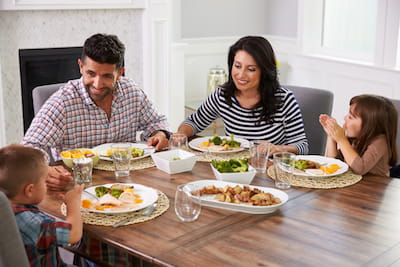How to Make the Most of Your Family Dinners
I talk to a lot parents who share that their child comes home from school and when they ask how their day was, they hear “fine” as their child walks toward their room and shuts the door. I praise these parents for trying to connect with their child, and then tell them they are doing it all wrong!
When should you talk to your child?
When I grew up my family ate dinner together at least five times per week. We sat together with the television off and didn’t answer the phone if it rang. Now, people seem a lot busier and there are so many more distractions. Many families find it hard to get everyone together for dinner at the same time.
 There is research that found that there are significant benefits for frequent family dinners. Frequent family dinners (five or more per week) has been linked to children being less likely to be overweight, more likely to eat healthier foods, have less delinquency (including substance use), lower depression, greater academic achievement, improved psychological well-being and positive family interactions.
There is research that found that there are significant benefits for frequent family dinners. Frequent family dinners (five or more per week) has been linked to children being less likely to be overweight, more likely to eat healthier foods, have less delinquency (including substance use), lower depression, greater academic achievement, improved psychological well-being and positive family interactions.
The routine of family meals also can generate feelings of closeness and comfort. Even when mealtimes feel hectic or disorganized, the simple act of regular mealtimes may be providing your child with stability. Family dinners are most beneficial when phones and the television are turned off, and if the family can’t get together for five dinners per week, breakfasts, lunches, and snacks can be substituted if needed.
What should you talk about with your child?
There are great articles online (Google it!) and products on Amazon.com that have hundreds of questions you can ask everyone in the family. Some questions are more serious, for example “What can our family do to make the world a better place?” while others are light hearted and fun, for example “If you could be any animal what would you be and why?” Asking questions related to peer groups are important for children, especially for teenagers. Other questions about personal goals can help a parent develop insight into what their child is thinking and doing.
How should you talk with your child?
Open-ended questions are the best type of questions to ask your child. They encourage elaboration, where you can’t answer with just a yes or a no answer, and they give room for exploration. One example of an open ended question is “Tell me about something that made you smile today at school.”
The most important part of asking questions is actually listening to your child’s answer. Reflective listening is repeating what your child has said back to them verbatim. This can be validating and demonstrates that you are listening. You should ask questions to help clarify if you don’t understand what they are saying or if something is unclear. It is important to provide empathy by acknowledging your child’s emotions, and encourage your child to keep on talking and opening up. Remember that non-verbal communication can be powerful, and children can tell by your body language if you are paying attention to them when they speak.
 Finding time for family dinners can be challenging. Starting conversations and particularly meaningful conversations can be difficult. Giving your child your full attention when there are so many distractions and other things going on is really hard sometimes. I would encourage you to think about all of the many benefits of connecting with your child during family dinners.
Finding time for family dinners can be challenging. Starting conversations and particularly meaningful conversations can be difficult. Giving your child your full attention when there are so many distractions and other things going on is really hard sometimes. I would encourage you to think about all of the many benefits of connecting with your child during family dinners.
Go for it and stick with it. Start tonight! Your family will become stronger and closer, which will bring more happiness in your life.







